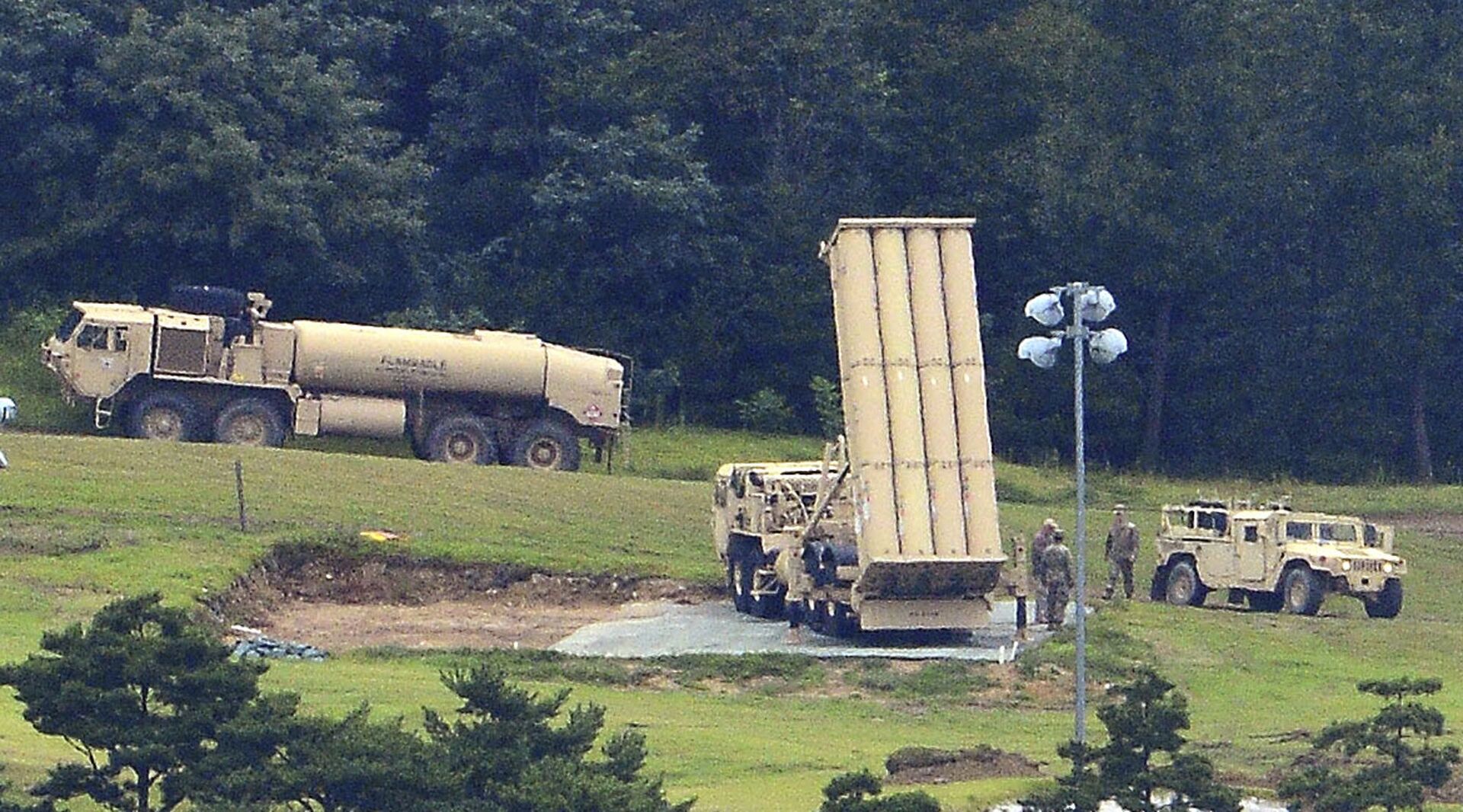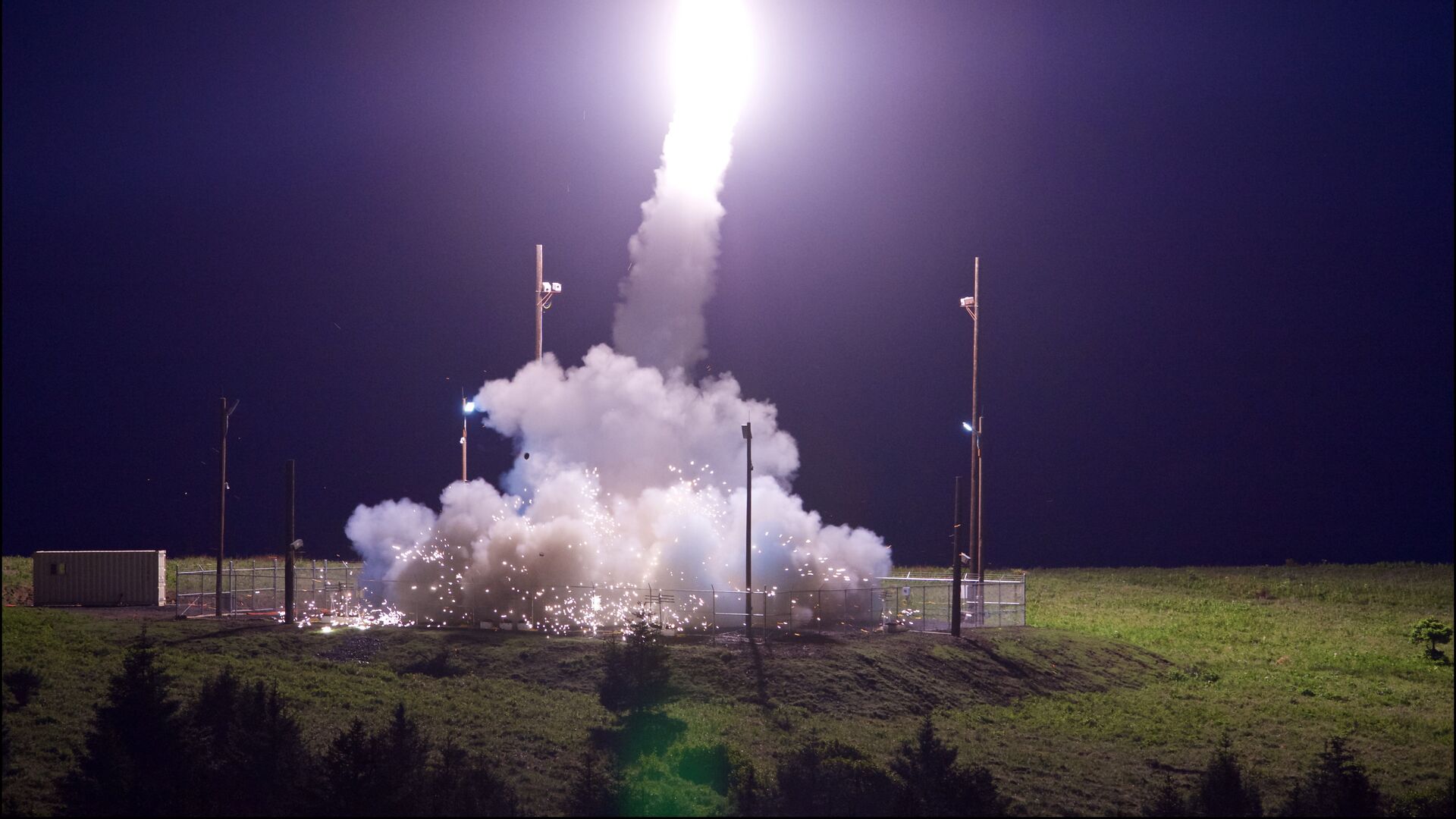https://sputnikglobe.com/20220421/pentagon-gives-lockheed-74-million-contract-to-build-8th-thaad-air-defense-battery-1094949079.html
Pentagon Gives Lockheed $74 Million Contract to Build 8th THAAD Air Defense Battery
Pentagon Gives Lockheed $74 Million Contract to Build 8th THAAD Air Defense Battery
Sputnik International
The Anti-Ballistic Missile Treaty (ABM) was intended to avert nuclear war by making it impossible to shoot down an enemy’s entire nuclear missile barrage, but... 21.04.2022, Sputnik International
2022-04-21T17:09+0000
2022-04-21T17:09+0000
2022-08-06T13:29+0000
terminal high altitude area defense (thaad)
lockheed martin
us missile defense agency (mda)
us
https://cdn1.img.sputnikglobe.com/img/105545/27/1055452727_0:508:4929:3280_1920x0_80_0_0_92faf7da8eba3981d78783b793b0bef4.jpg
On Thursday, US defence contractor giant Lockheed Martin announced it had received a $74 million contract from the Pentagon to produce another battery of Terminal High Altitude Area Defense (THAAD) weapons systems. It will be the eighth such battery for the US Army and is expected to be delivered by 2025.THAAD shoots down ballistic missiles in their terminal phase using a kinetic impactor instead of an explosive, so as to avoid detonating a nuclear-tipped missile’s warhead. It was first fielded in 2008, but only had its first combat experience earlier this year, when a THAAD stationed in the United Arab Emirates (UAE) shot down an inbound ballistic missile fired by the Houthis in Yemen.That radar, which is an X-Band active electronically scanned array, allows it to track an object "the size of a baseball from about 2,900 miles (4,600 kilometres) away,” according to US officials. A THAAD battery stationed in South Korea has aroused the fury of China, which alleges is intended to spy on China, rather than deter a potential North Korean attack.In the wake of the deployment, Beijing encouraged Chinese citizens to boycott South Korea’s tourism industry and some products, costing Seoul some $7 billion in economic losses. THAAD was unpopular among Koreans as well, with villagers in Seongju county mounting an effective protest campaign against the missile batteries being deployed nearby.The US Missile Defense Agency (MDA) has worked in recent years to integrate THAAD into a larger network of air defence systems, including the Patriot PAC-3 systems and short-range air defence (SHORAD) systems, including potentially the Iron Dome. The Integrated Air and Missile Defence Battle Command System (IBCS) has even plugged into the F-35 Joint Strike Fighter’s vast sensor net, using information from an aircraft radar to shoot down a cruise missile target in a test last July.Most recently, the MDA tested another type of integration, though: firing a PAC-3 missile from a THAAD launcher, according to Defense Post.
Sputnik International
feedback@sputniknews.com
+74956456601
MIA „Rossiya Segodnya“
2022
Sputnik International
feedback@sputniknews.com
+74956456601
MIA „Rossiya Segodnya“
News
en_EN
Sputnik International
feedback@sputniknews.com
+74956456601
MIA „Rossiya Segodnya“
Sputnik International
feedback@sputniknews.com
+74956456601
MIA „Rossiya Segodnya“
terminal high altitude area defense (thaad), lockheed martin, us missile defense agency (mda), us
terminal high altitude area defense (thaad), lockheed martin, us missile defense agency (mda), us
Pentagon Gives Lockheed $74 Million Contract to Build 8th THAAD Air Defense Battery
17:09 GMT 21.04.2022 (Updated: 13:29 GMT 06.08.2022) The Anti-Ballistic Missile Treaty (ABM) was intended to avert nuclear war by making it impossible to shoot down an enemy’s entire nuclear missile barrage, but after the US annulled the treaty in 2002, it pushed ahead with a new generation of interceptors that Russia and China have decried as threatening.
On Thursday, US defence contractor giant Lockheed Martin announced it had received a $74 million contract from the Pentagon to produce another battery of Terminal High Altitude Area Defense (THAAD) weapons systems. It will be the eighth such battery for the US Army and is expected to be delivered by 2025.
“This award demonstrates the US government’s continued confidence in the THAAD Weapon System and in its unique endo- and exo-atmospheric defence capability,” Dan Nimblett, Vice President of Upper Tier Integrated Air and Missile Defense at Lockheed Martin Missiles and Fire Control, said in a news release. “With 16 of 16 successful flight test intercepts and recent combat success clearly documenting the effectiveness of THAAD, adding an eighth battery will further enhance readiness against existing and evolving ballistic missile threats.”
THAAD shoots down ballistic missiles in their terminal phase using a kinetic impactor instead of an explosive, so as to avoid detonating a nuclear-tipped missile’s warhead. It was first fielded in 2008, but only had its
first combat experience earlier this year, when a THAAD stationed in the United Arab Emirates (UAE) shot down an inbound ballistic missile fired by the Houthis in Yemen.
Other THAAD batteries are deployed in Romania, South Korea, Guam, and Japan. Each battery consists of at least six launcher vehicles, which carry eight missiles each; two mobile tactical operations centres; and a powerful AN/TPY-2 ground-based radar.
That radar, which is an X-Band active electronically scanned array, allows it to track an object "the size of a baseball from about 2,900 miles (4,600 kilometres) away,”
according to US officials. A THAAD battery stationed in South Korea has aroused the fury of China, which alleges is intended to spy on China, rather than deter a
potential North Korean attack.
Xing said Seoul “should not be treading in that step again,” noting that following the first deployment in 2016, their relations became “really bad”. He added that they had “recovered the right track because the two nations made joint efforts,” according to US military news outlet Stars and Stripes.
In the wake of the deployment, Beijing encouraged Chinese citizens
to boycott South Korea’s tourism industry and some products, costing Seoul some $7 billion in economic losses. THAAD was unpopular among Koreans as well, with villagers in Seongju county mounting
an effective protest campaign against the missile batteries being deployed nearby.
In February, South Korea’s Agency for Defence Development test-fired a potential domestic replacement for THAAD. the L-SAM, built by South Korean contractors Hanwha Group and LIG Nex 1. It has also worked to develop its own alternatives to the US’ Patriot missile and Israel’s Iron Dome systems.
The US Missile Defense Agency (MDA) has worked in recent years to integrate THAAD into a larger network of air defence systems, including the Patriot PAC-3 systems and short-range air defence (SHORAD) systems,
including potentially the Iron Dome. The Integrated Air and Missile Defence Battle Command System (IBCS) has even plugged into the F-35 Joint Strike Fighter’s vast sensor net, using information from an aircraft radar to
shoot down a cruise missile target in a test last July.
Most recently, the MDA tested another type of integration, though: firing a PAC-3 missile from a THAAD launcher, according to
Defense Post.


